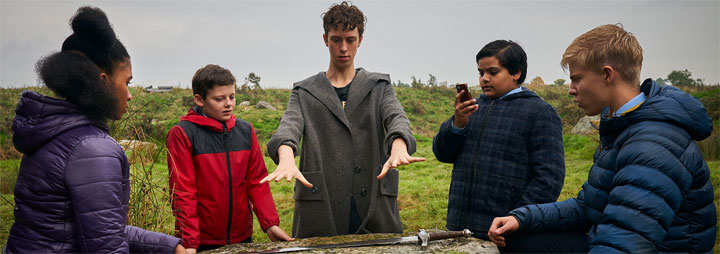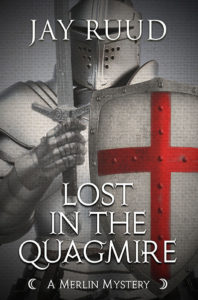The Kid Who Would Be King
Joe Cornish (2019)
[av_image src=’http://jayruud.com/wp-content/uploads/2014/08/Tennyson-180×180.jpg’ attachment=’77’ attachment_size=’square’ align=’left’ animation=’left-to-right’ link=” target=” styling=” caption=’yes’ font_size=” appearance=’on-hover’]
King Arthur has not generally fared particularly well in the movies, especially lately. Guy Ritchie’s King Arthur: The Legend of the Sword, despite its whiz-bang special effects and star studded cast, was so horrible I could barely keep my popcorn down. The problem was that the film took a few motifs from the traditional legend and made up a whole lot of crazy stuff about them that gave no thought to any traditional telling of the story. Antoine Fuqua’s equally Hollywoodized 2004 film of King Arthur also fizzled, even with Clive Owen and Keira Knightley giving it their best shot. It was less horrible than Ritchie’s version, but still hit the wrong note, advertising itself as a “demystified version” of the tale, which apparently meant making up a whole new story that had nothing at all to do with the Arthurian legend but was deemed to be “historical.”
As a result, some folks may be thinking that the legend of Arthur is no longer valid or applicable to contemporary society. But of course, that is precisely the thinking that made Ritchie or Fuqua completely gut and renovate the story, with disastrous results, so that the idea becomes a self-fulfilling prophecy. It’s not that, to be successful, a film needs to slavishly follow the story as told in Malory or in Tennyson. Every new version of the Arthurian legend adds something, or gives a twist to something that has come before. But in all cases, a successful retelling shows some awareness of the story as traditionally told, and so gives it an intelligent new twist. It’s no accident that the most successful film ever made based on Arthurian legend is Monty Python and the Holy Grail, not because it makes up a whole new story, but because the Pythons, particularly director Terry Jones, were extremely well versed in medieval history and in the traditional elements of the Arthurian legend. So the moral is, there’s nothing irrelevant in Arthurian tradition. It’s like anything else: Make a decent movie and people will come to see it.
Which is why I do have some hope for The Kid Who Would Be King, which opened this past weekend in the United States. Joe Cornish (Attack the Block), who directed the film and wrote the screenplay, does seem to have actually familiarized himself with some genuine Arthurian lore. In particular, Cornish evinces some familiarity with T.H. White’s classic modern version of the legend, The Once and Future King. Opening sequences of the film are animated and reflect to some extent Disney’s Sword in the Stone (based on the first section of White’s book), and the phrase “Once and Future King” is used several times in the film. The depiction of Merlin owes a great deal to White, as Cornish includes White’s idea of Merlin living backwards, and further associates Merlin with an owl, as White does in the form of Merlin’s pet Archimedes. Further, the idea of the quest forms the structure of the film, as it does most Arthurian romances, and, significantly, Cornish is actually interested in the concept of chivalry, an idea that seems passé to peddlers of medieval motifs in films these days.
The film’s premise is in keeping with certain aspects of Arthurian legend. King Arthur’s half-sister Morgana (Rebecca Ferguson of the Mission: Impossible franchise) tried to undermine Arthur’s reign by stealing his enchanted sword Excalibur (yes, that’s straight out of Thomas Malory). Thus she was defeated and condemned to live perpetually imprisoned in an underworld, but she threatened to return at a time when the people of Britain became so divided and lacking in moral compass that they would be unable to pull together and resist the threat of true evil. Turns out that time has come: It’s certainly Cornish’s comment on the current Brexit debacle in Britain, but surely he also believes the portrayal of disunion and moral and political turpitude will resonate just as soundly with current American audiences as well.
In Arthurian legend, King Arthur is taken at the point of death to Avalon to dwell with the Lady of the Lake and have his wounds tended. He will wait there until the time when Britain needs him most. This is what makes him the once and future king—he was king once and will be king in the future, when he returns. Morgana’s threat to come back and enslave humanity in this film is surely the time that Britain needs Arthur the most, and in this film, that “return” takes the form of a new hero drawing the sword from the stone.
In contemporary Britain, 12-year-old Alex (Louis Ashbourne Serkis, son of Andy) spends his days trying to live decently, to avoid his school’s bullies, the bigger and meaner Lance (Tom Taylor of TV’s Doctor Foster) and Kaye (Rhianna Dorris from TV’s The Secret Life of Boys), and to support his friend Bedders (Dean Chaumoo) and protect himfrom bullying. Falling into a deserted construction site one evening while running from the bullies, Alex comes upon a sword sticking out of a large block of concrete, and pulls it out with ease, thus indicating he is the savior chosen to protect the kingdom.
Uncovering the sword means that Morgana will be coming to find it, and Alex gains the support of a very quirky new student at his school who calls himself Marlin (Angus Imrie of TV’s The Hollow Crown), who is of course actually Merlin himself, returned from wherever he’s been hiding these past fifteen centuries in order to assist Alex in defeating Morgana’s assault, which will occur during a solar eclipse in four days. Alex, needing all the help he can get and realizing that to win, he must, like King Arthur, turn his enemies into allies, knights Lance and Kaye as well as Bedders (that’s Lancelot, Kay, and Bedivere, in case you didn’t catch it) in order to stave off the fiery mounted zombie knights who rise each night to try to destroy him in advance of Morgana’s rising.
Of course, Lance and Kaye aren’t particularly sanguine supporters, and much of the film is devoted to their conversion to the cause. In the meantime Alex, accompanied by Merlin and his three knights, decides on a journey to Tintagel in Cornwall (the place Arthur himself was born) in order to find his father. If this sounds like a lot of archetypal Hero journey motifs coming at you, consider this: In Tintagel, Alex is drawn into an underground cave where he confronts Morgana herself (the archetypal Jungian Shadow, representing his fears and doubts) and emerges all the stronger for the final confrontation with evil.
Any more of this would be spoiler territory. But in the end, the movie does deliver on its promises. It is a creditable Arthurian romp. The child actors are not cloying or talentless, though they tend to be rather bland, except for Irei who is something of a hoot as the boy wizard with magic hand movements, who turns into an owl at will and, occasionally, turns into his Old Man Wizard self in the form of Patrick Stewart looking like a ragged Gandalf but adding a bit of gravitas to the part.
This is a family film, and in many ways is geared toward kids on a pre-teen level, although adults, particularly Gen-Xers, will be pleasantly reminded of some of the kid-adventure films of their youth, especially ’80s films like E.T., Adventures in Babysitting, or, especially, The Goonies. The synthesizer-heavy score by Electric Wave Bureau seems particularly designed to give the movie that old-time ’80s atmosphere. But it is kid-focused, so the sociopolitical implications are pretty heavy handed, and there’s nothing subtle about the plot. It’s also over-long. The “message” of the film is fairly blatant as well: We need to come together as a people to be strong enough to face the real perils ahead of us.
But the film’s virtues outweigh its defects. In recent years, the far right has popularly fantasized the Middle Ages in illogical and unsubstantiated ways that are absurd to any actual student of medieval history, literature, or culture, declaring (in a manner very similar to the way fascists in Germany and Spain romanticized the Middle Ages in the 1930s) that the natural superiority of white, Christian, European armies stopped Islamic expansion in later medieval times (never mind the actual facts that all but the first of the eight crusades was a dismal failure). The Kid Who Would Be King relegates such attitudes to the dustbin of history, where they belong, and stresses instead the true nature of chivalry as expressed in Arthurian literature: In a loose paraphrase of Malory’s Pentecost oath, taken by all of Arthur’s knights, Merlin in this film lays out four rules for the modern-day knights: 1) Honor those you love; 2) Refrain from wanton offense (that is, be “courteous” in the medieval sense, giving all people the respect they deserve); 3) Speak the truth; and 4) Persevere until the end. Those are rules that any culture, medieval or modern, might do well to live by.
Take your kids. Three Tennysons for this one.
Jay Ruud’s most recent novel, Lost in the Quagmire: The Quest of the Grail, IS NOW available from the publisher AS OF OCTOBER 15. You can order your copy direct from the publisher (Encircle Press) at Purchase Tramadol Cod http://encirclepub.com/product/lost-in-the-quagmire/You can also order an electronic version from Smashwords at https://www.smashwords.com/books/view/814922
When Sir Galahad arrives in Camelot to fulfill his destiny, the presence of Lancelot’s illegitimate son disturbs Queen Guinevere. But the young knight’s vision of the Holy Grail at Pentecost inspires the entire fellowship of the Round Table to rush off in quest of Christendom’s most holy relic. But as the quest gets under way, Sir Gawain and Sir Ywain are both seriously wounded, and Sir Safer and Sir Ironside are killed by a mysterious White Knight, who claims to impose rules upon the quest. And this is just the beginning. When knight after knight turns up dead or gravely wounded, sometimes at the hands of their fellow knights, Gildas and Merlin begin to suspect some sinister force behind the Grail madness, bent on nothing less than the destruction of Arthur and his table. They begin their own quest: to find the conspirator or conspirators behind the deaths of Arthur’s good knights. Is it the king’s enigmatic sister Morgan la Fay? Could it be Arthur’s own bastard Sir Mordred, hoping to seize the throne for himself? Or is it some darker, older grievance against the king that cries out for vengeance? Before Merlin and Gildas are through, they are destined to lose a number of close comrades, and Gildas finds himself finally forced to prove his worth as a potential knight, facing down an armed and mounted enemy with nothing less than the lives of Merlin and his master Sir Gareth at stake.
http://economiacircularverde.com/que-es-la-economia-circular/ Order from Amazon here: https://www.amazon.com/Lost-Quagmire-Quest-Merlin-Mystery/dp/1948338122
https://drcarlosarzabe.com/dr-carlos-arzabe/ Order from Barnes and Noble here: https://www.barnesandnoble.com/w/lost-in-the-quagmire-jay-ruud/1128692499?ean=9781948338127


